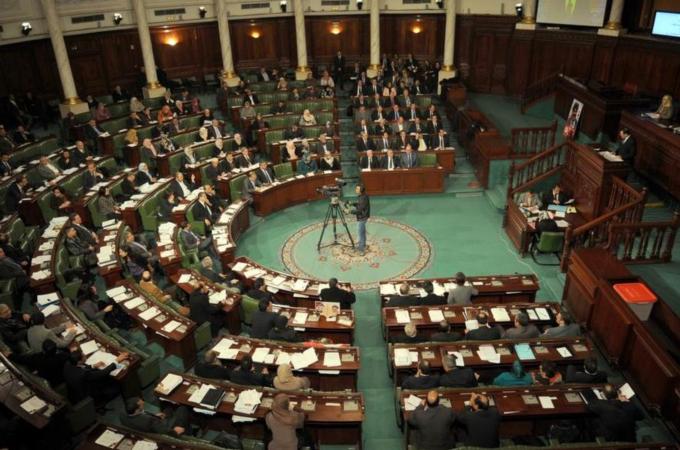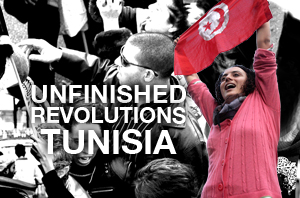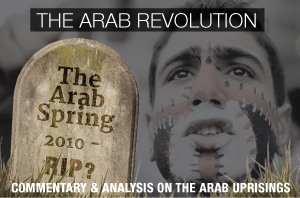Tunisia's vote on the new constitution gives the Arab Spring a timely and a badly-needed booster shot.

Tunisia is the bellwether of the Arab Spring [AFP]
| |||
| Tunisia's National Constituent Assembly (NCA)[Ar] has approved the final articles of the country's new constitution on January 25, three years after an uprising against autocrat Zine El Abidine Ben Ali inspired a wave of Arab revolts. With neighbouring Libya torn asunder by all kinds of cleavages and violence, and Egypt in turmoil and now reeling under military patronage, the odds seemed for a while heavily stacked against Tunisia. True, the country has several times over the past three years come close to a near political sclerosis and hiatus in democratic reconstruction and consensus-building. There has also been terrorism, corruption, nepotism, and ideological dogmatism here and there. More broadly, the days of the Arab Spring looked numbered and its future uncertain as a few regional powers, overtly and covertly, put their political and financial weight behind the Egyptian coup. Neither Syria's killing fields nor the Bahraini and to a lesser extent the Yemeni "Springs" have helped, having failed to keep their original verve and panache, much less promise of freedom and dignity. With Tunisia's democratic constitution being born, the Arab Spring gets a timely and a badly-needed booster shot. Egypt, and to a lesser extent Libya, will be closely scrutinising every development in the birthplace of the Arab Spring. In particular, Egypt's youth, democrats of all colour, and those forces and voices that celebrated and embraced Tunisia's success when former President Zine El Abidine Ben Ali was ousted in January three years ago, may once again find themselves drawn to an experiment that has thus far been more peaceful, consensual, army-free and inclusive than their own. Here lies the significance of the triumph of bargain politics in Tunisia - despite the slow pace of reform which turned out to be a blessing in disguise - over military tutelage noted for exclusionary politics. So long as Tunisia progresses towards democratic reconstruction through constitutional, pluralist and inclusive democratic reconstruction, Egyptians and Libyans, among others, will feel compelled and somewhat pressured to follow suit or at least flag the Tunisia "experiment" (versus "model") as worthy of attention and comparison with the local processes.
More than any other Arab Spring country, what happens in Tunisia will have implications for Egypt.The two-way flow of information between the two countries is historic: From the medieval migratory Arab movements via Egypt to Tunisia and from Tunisia to Egypt (e.g.: the Fatimids who left Mahdia to relocate in Cairo and build their new state there). Tunisians were remarkable via their "brilliance" to invent the Arab Spring, opening the deluge of Arab-wide protests that sustained the revolutionary elan. Egyptians were equally brilliant by "staging" the Arab Spring, acting it out bigger, brighter and more impactful on the regional and global theatres of popular and informal politics. Of late, Egypt's rebel campaign (tamarrod) that deposed the Arab Spring's first elected president, Mohamed Morsi, and ditched its first constitution, has had only a negligent impact on Tunisia. Nonetheless, those events galvanised civil society, especially secularists and leftists, against the Islamists. Luckily, Tunisia has no analogue to General Abdel-Fattah al-Sisi (Egypt's strong man who serves as minister of Defense in the present government) and no equivalent of the Supreme Council of Armed Forces (SCAF), and generally the country's mood tends to swing more towards parleying and bargaining. From the word go, "degage" and the like, Tunisia and Egypt have generally experienced reciprocal processes allowing for transfer of revolutionary know-how (bloggers, protesters' solidarity of how to counter riot police tactics), Islamist exchange, trade union and women's solidarities, and overall infectious politics going back and forth. The first echoes of triumph over Ben Ali's police machinery and state in Tunis were heard in Cairo. Tahrir Square was one of the first sites of moral protest that quickly responded and celebrated the triumph over Ben Ali, a dictator that reminded Egyptians of their own dynasty. So it is not surprising at all that since July 2013, the mood of Egypt's tamarrod has more or less travelled among anti-Nahda forces and voices in Tunisia. But there is one difference. Instead of producing an ouster as in Egypt, tamarrod led to a change of tact - perhaps a corrective - in the Islamist party's approach to statecraft. It has since measured up to the exigencies of the post Egypt coup moment and displayed a capacity for adaptation. Triumph of bargain politics Democratic transition in Tunisia continues to face challenges that are by no means intractable - and the limited economic horizon tops the key concerns after the next elections. Incremental steps towards creating a post-Ben Ali national charter have not been shielded from this inevitability. Nonetheless, a leap forward has occurred recently averting a crisis in the drafting of this charter in this deeply-contested transition period. A previously Nahda-led government after months of negotiations has finally stepped down to make way for an "independent" government reflecting consensus from across the Tunisian political scene. Resolution of the disagreements surrounding the government was a hard-won bargain among all actors. Amid a new-found sense of optimism with Mehdi Jomaa becoming prime minister, the deadlock in the charter drafting process has been broken. And the charter has been passed. A robust demonstration of the uneven yet persevering path of transition from an authoritarian modus operandi obsessed with power to a democratic set-up able to reconcile differences. Alternative civic discourses meet in the space of state institutions and practices that serve as a lesson for other Arab Spring countries to resolve conflicts without resorting to violence. Route to Tunisia's new constitution The significance of the democratic reconstruction process in Tunisia has been more or less the capacity of secularists and Islamists to play ball, allowing for reciprocal contests to never get out of hand. State foundations never needed to be propped up by an army (as in Egypt). This is more or less the lasting and most important gift of Bourguiba's statecraft. At no stage were state structures threatened by failure (as in Libya) despite newly empowered inexperienced rulers. Moreover, interim politics have been founded on a legal or "contractual" foundation. The initial post-Ben Ali "mini-constitution" has served its purpose. However, man-made errors have caused a delay in the original transition schedule, but, with the benefit of hindsight, that has not been a bad thing for Tunisia. Above all else, at the core of drafting a democratic and modern constitution has been the National Constituent Assembly (NCA) whose sole tough assignment was from the outset to write the charter.The "troika" bringing together secularists and Islamists in the country's first ever power-sharing exercise has been a stroke of genius. This is where Tunisia's Islamists outclass Islamists across the Arab region: phases of democratic reconstruction are no time for seeking power monopoly or being driven by majoritarian political equations. Saving democracy from itself meant, at one level, by-passing rules of democratic engagement such as being dogmatic about majority rule. Nahda also knew when to make concessions. As a result of concessionary and bargain politics, Nahda has improved its position whilst its main rival, Nidaa Tounes, is so racked by internal dissent. Lastly, the Federated Union of Tunisian Labour (UGTT) has learnt, despite initial trepidation due to lack of neutrality, how to revise its politics and provide a "balancing act" that the democratic reconstruction process called for. By leading and seeking a moderating role, especially through the National Dialogue process, it has helped tone down ideologically driven divides and mutually exclusive political agendas, voices and forces. Constitutions not the end-all Tunisia has passed a democratic constitution that speaks to universality and specificity. It equalises between men and women, it embraces religious roots and identity but equally enshrines civil, legal and rational politics. It celebrates freedom and dignity, the very slogans of Arab youths across the Arab Spring geography, as part of the new political mantra to guide self-governance. In recognition of the struggles staged by youth and impoverished regions, the new constitution promises levelling of the playing field in the spirit of social and transitional justice. For now, the mission of democratic reconstruction will be half accomplished when the NCA, having passed the charter, clears the way for the country's first free and fair multi-party elections that will signal the end of interim institutions. Written constitutions are not the end-all of democratic politics nor do they always deliver self-government. That task, in Tunisia, will remain the unwritten rule of the newly empowered publics, emboldened by their might to force just rule or force out the unjust. This article of popular faith re-writes the key rule that will organise formal-informal politics across the Arab Spring geography, constitution or no constitution |



No comments:
Post a Comment